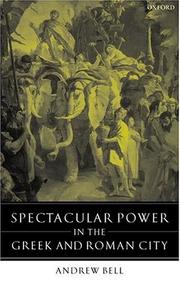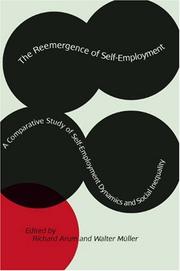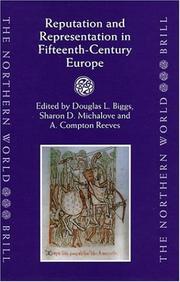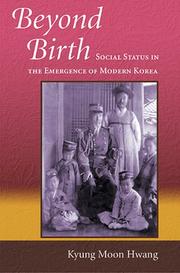| Listing 1 - 6 of 6 |
Sort by
|
Book
Year: 2004 Publisher: Bruxelles: Institut Supérieur d'Architecture Saint-Luc Bruxelles,
Abstract | Keywords | Export | Availability | Bookmark
 Loading...
Loading...Choose an application
- Reference Manager
- EndNote
- RefWorks (Direct export to RefWorks)
La participation active d'Albert Speer au régime national-socialiste, en tant qu'architecte officiel puis comme ministre de l'Armement et de l'Economie de guerre, demeure un sujet déconcertant sinon gênant pour la plupart des architectes et historiens de l'architecture. L'analyse de son architecture dans ses relations avec l'idéologie nazie n'a rarement, sinon jamais été abordée par les architectes. L'objectif premier de ce mémoire est de pallier les manquements de certains ouvrages en instaurant un outil de compréhension de la relation entre l'architecture de Speer et le régime national-socialiste. Il s'agit de démontrer que l'architecture ne peut être dissociée de son contexte et que, par conséquent, on ne peut parler de neutralité politique de l'architecture. De là la nécéssité de s'interroger sur le théorie de Léon Krier qui consiste à dissocier l'architecture de Speer du régime national-socialiste pour ainsi la récupérer comme façade civilisatrice. L'analyse de l'influence et du rôle qu'a joué l'architecture sous le troisième Reich constitue le point de départ de ce mémoire. Nicolas Schuybroek y aborde les influences subies par Speer ainsi que l'architecture qu'il développe par la suite, illustrant ses propos par l'analyse d'édifices de l'axe nord-sud à Berlin. Cet état des lieux est suivi d'une réflexion sur la neutralité politique de l'architecture. Dans un premier temps, l'auteur fait état des conceptions de Krier, infirmant ensuite leur exactitude à travers les propres déclarations de Speer ainsi que par l'analyse de la relation entre architecture et population allemande, en termes de masse.
Architecture de prestige --- Totalitarisme --- Speer, Albert --- Berlin

ISBN: 0742528820 0742528812 Year: 2004 Publisher: Totowa Rowman & Littlefield
Abstract | Keywords | Export | Availability | Bookmark
 Loading...
Loading...Choose an application
- Reference Manager
- EndNote
- RefWorks (Direct export to RefWorks)
Social influence. --- Social influence --- Influence (Psychology) --- Social psychology --- Prestige --- Social pressure

ISBN: 0199242348 0191714097 0199298270 9786610753529 0191529303 1280753528 1423753143 9780199298273 9780191529306 9780199242344 Year: 2004 Publisher: Oxford: Oxford University Press,
Abstract | Keywords | Export | Availability | Bookmark
 Loading...
Loading...Choose an application
- Reference Manager
- EndNote
- RefWorks (Direct export to RefWorks)
Andrew Bell's analysis of the power of prestige in civic communities of the ancient world demonstrates the importance of crowds' aesthetic and emotional judgement upon leaders and their ambitious claims for immediate and lasting significance; and also finds consideration of this dynamic still to be valuable for modern citizens. An initial discussion of the fall of Ceausescu in 1989 prompts theoretical considerations about the inseparability of authority and its manifestation; andscrutiny of Julius Caesar's gestures towards self-definition introduces the complexity of ancient political relation
Power (Social sciences) --- Rome --- Municipal government --- Greece --- Prestige --- Prestige. --- Cities and towns --- City government --- Municipal administration --- Municipal reform --- Municipalities --- Urban politics --- Local government --- Metropolitan government --- Municipal corporations --- Empowerment (Social sciences) --- Political power --- Exchange theory (Sociology) --- Political science --- Social sciences --- Sociology --- Consensus (Social sciences) --- Social psychology --- Social influence --- Government --- Power

ISBN: 069111756X 0691117578 9786612158810 1282158813 140082611X 9781400826117 9780691117577 9780691117560 9780691117577 9781282158818 Year: 2004 Publisher: Princeton, N.J. : Princeton University Press,
Abstract | Keywords | Export | Availability | Bookmark
 Loading...
Loading...Choose an application
- Reference Manager
- EndNote
- RefWorks (Direct export to RefWorks)
This book presents results of a cross-national research project on self-employment in eleven advanced economies and demonstrates how and why the practice is reemerging in modern societies. While traditional forms of self-employment, such as skilled crafts work and shop keeping, are in decline, they are being replaced by self-employment in both professional and unskilled occupations. Differences in self-employment across societies depend on the extent to which labor markets are regulated and the degree to which intergenerational family relationships are a primary factor structuring social organization. For each of the eleven countries analyzed, the book highlights the extent to which social background, educational attainment, work history, family status, and gender affect the likelihood that an individual will enter--and continue--a particular type of self-employment. While involvement with self-employment is becoming more common, it is occurring for individuals in activities that are more diverse, unstable and transitory than in years past.
Self-employed. --- Equality. --- Social status. --- Travailleurs indépendants --- Egalité (Sociologie) --- Statut social --- Travailleurs indépendants --- Egalité (Sociologie) --- Social standing --- Socio-economic status --- Socioeconomic status --- Standing, Social --- Status, Social --- Egalitarianism --- Inequality --- Social equality --- Social inequality --- Free-lancers --- Freelancers --- Power (Social sciences) --- Prestige --- Political science --- Sociology --- Democracy --- Liberty --- Persons

ISBN: 1280914785 9786610914784 9047404734 1429427450 9781429427456 9789004136137 9004136134 9781280914782 6610914788 9789047404736 9004136134 Year: 2004 Publisher: Leiden ; Boston : Brill,
Abstract | Keywords | Export | Availability | Bookmark
 Loading...
Loading...Choose an application
- Reference Manager
- EndNote
- RefWorks (Direct export to RefWorks)
This volume deals with political, military, social, architectural, and literary aspects of fifteenth-century England. The essays contained in the volume range across the century from some of the leading scholars currently working in the period. With contributions by Mark Arvanigian, Kelly DeVries, Sharon Michalove, Harry Schnitker, Charlotte Bauer-Smith, Candace Gregory, Helen Maurer, Karen Bezella-Bond, E. Kay Harris, Daniel Thiery, John Leland, Peter Fleming, Virginia K. Henderson.
Fifteenth century --- Social status --- Social standing --- Socio-economic status --- Socioeconomic status --- Standing, Social --- Status, Social --- Power (Social sciences) --- Prestige --- 15th century --- Middle Ages --- Renaissance --- History --- England --- Angleterre --- Anglii︠a︡ --- Inghilterra --- Engeland --- Inglaterra --- Anglija --- England and Wales --- Civilization --- Renaissance. --- 1066-1485 --- Congresses --- Europe --- To 1500 --- Revival of letters --- History, Modern --- Civilization, Medieval --- Civilization, Modern --- Humanism

ISBN: 0674016564 1684174074 9780674016569 9781684174072 Year: 2004 Volume: 243 Publisher: Boston Leiden;Boston Harvard University Asia Center BRILL
Abstract | Keywords | Export | Availability | Bookmark
 Loading...
Loading...Choose an application
- Reference Manager
- EndNote
- RefWorks (Direct export to RefWorks)
Bureaucracy --- Social structure --- Social status --- History --- Korea --- -Social structure --- -Social status --- -K9321 --- K9300.60 --- Social standing --- Socio-economic status --- Socioeconomic status --- Standing, Social --- Status, Social --- Power (Social sciences) --- Prestige --- Organization, Social --- Social organization --- Anthropology --- Sociology --- Social institutions --- Interorganizational relations --- Political science --- Public administration --- Organizational sociology --- History. --- Korea: Communities, social classes and groups -- social class and class systems --- Korea: Social sciences -- social and cultural history -- modern period (1860s-[1945]), 20th century general --- Chosŏn dynasty, 1392-1910. --- K9321
| Listing 1 - 6 of 6 |
Sort by
|

 Search
Search Feedback
Feedback About UniCat
About UniCat  Help
Help News
News